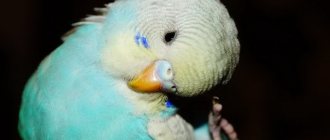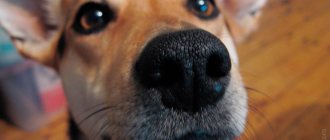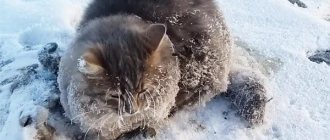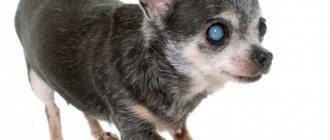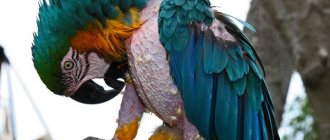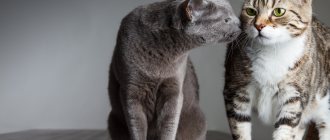The parrot is trembling or ruffled: what does this mean?
Do you notice that the bird is shaking and clucking, but you don’t know why? A parrot's body trembling may mean that your pet is sick, scared, or in discomfort. Everything can be simple or very complicated, but this fact certainly cannot be ignored. If you get yourself a parrot, you must take care of it and protect it from various dangers.
Experienced bird owners have probably more than once encountered the problem when the bird trembles, puffs itself, and often closes its eyes. Behavior that is uncharacteristic for a pet is the first warning signal for the owner that urgent action needs to be taken. Sometimes it’s enough just to warm up the bird, and sometimes you need to quickly go to the doctor. First, you should take a close look at the bird to understand why it is ruffled, and only then draw conclusions regarding its condition.
Why is he shaking his head?
A parrot shakes its head for many reasons:
- grains stuck in the crop;
- injury;
- nausea;
- the presence of a tracheal mite;
- tumor of the swallowing organs.
Attention! You should not ignore symptoms such as vomiting, loose stools, nausea, and stretching of the neck. The slightest delay can cost the bird's life.
First you need to examine the bird and find the reason for this behavior. The beak, plumage, and paws are carefully examined.
Causes of trembling
The main reasons for this behavior:
- Hypothermia. Perhaps you placed the cage in a draft or simply forgot to close the window? If the room is cool, and the parrot’s wings are trembling, then he is simply cold. Why don't his wings protect him from freezing? Although plumage is a protective barrier from the environment, it cannot completely protect the bird’s skin from all adverse effects.
- Fear or stress. Any animal that lives in your home can scare the bird with a sudden movement or sound. Do you have children? Why don't you ask if they scared the parrot? If the pet is very frightened, it will tremble and cackle. The same thing happens with stress. Changing your place of residence or introducing a new bird can be a shock for your pet.
- Disease. If your budgerigar is trembling and ruffled, and besides, you notice other symptoms, then most likely the bird is sick. The bird may sneeze, close its eyes, its droppings will be liquid, and its crop will be filled with vomit. Signs of the disease can occur in a complex or individually. Any of them is a reason to see a doctor.
- Avitaminosis. If there is a lack of vitamins, any parrot will crest, tremble and bristle its tail. This happens when the bird’s diet is too monotonous and poor in useful components.
If your parrot is ruffled, trembles a little, appears drowsy (closes his eyes more often and sleeps), cannot poop, but has a good appetite. In this case, you should show the bird to a doctor, since these symptoms may indicate various pathologies.
In the video, the parrot's wings are shaking.
When to see a doctor
There are certain symptoms that you should immediately contact your veterinarian for:
- fracture of limbs, tail or wing;
- the appearance of a bleeding wound on the body;
- signs of poisoning and digestive disorders;
- apathy, drowsiness;
- itching of the skin, excessive loss of feathers;
- partial or complete refusal to eat;
- convulsions in a budgie;
- uncharacteristic cry, wheezing.
In the situations described above, it is better to consult a specialist for a diagnosis. You may certainly not know what causes this or that symptom, but the doctor will quickly determine the cause of this condition and alleviate it as soon as possible.
Causes not related to the disease
If a parrot has a sad ruffle, this does not mean that it is physically ill. The bird is often worried due to some external stimuli. When there are no other manifestations of the disease, short-term chills and frizz are probably caused by fear or cold.
Fear and stress
Budgerigars have a very weak heart and are extremely shy. These birds can be unsettled by loud music, sharply turned on lights, or children running around. When experiencing stress, a budgerigar hides its beak on its back and crests, shrinks, trying to become invisible. His heart is pounding, ready to jump out of his chest. If you notice this behavior, eliminate the irritants, and then calm your pet.
Freezing
In the room where the budgerigar lives, the air temperature must be at least 22 degrees. The heat-loving bird, although covered with dense feathers with down, is very sensitive to low temperatures. This is especially true for those who are going through a molting period. Having frozen, the ruffled parrot hides its beak in the feathers of its back, under its wing. He is half asleep, barely moving, trying to warm up.
Not enough light
Another reason why a parrot often sits with its ruffles is the short daylight hours. In winter, you need to artificially increase the length of the day: turn on an ultraviolet lamp in the evenings. Not only the duration of light exposure is important for the parrot, but also the quality of the light. Birds need vitamin D, and it is produced in the body under the influence of open sun or rays from special devices.
We recommend reading: How many days do budgies hatch eggs?
Adaptation of a bird to a new home
When changing a cage or moving to a new home, a parrot may feel not just discomfort, but even severe stress. You will notice that he is cackling and shaking, but you will not understand why. If you have recently moved or bought a new cage, then you will just need to wait until the bird gets used to it, carefully examining its home with its eyes.
Sorry, there are no surveys available at this time.
Talk to him, monitor his behavior and do not let him out for several days. Let the baby get used to the new home, look around, notice all the toys. It happens that the bird gets ruffled and looks irritated and constantly angrily rushes at some object. To calm your pet, simply remove the irritant from the cage.
Avitaminosis
The parrot is shaking due to a lack of vitamins. You should consult your veterinarian about this. Perhaps changing the food to one enriched with microelements will help. After consultation, a vitamin supplement is chosen for the main diet. Feeding with fresh vegetables and fruits cannot be ignored. Almost everything suits parrots except papaya, persimmons and nuts. It is also necessary to offer the bird greens:
- sorrel;
- dandelions;
- wheatgrass;
- shepherd's bag
The main thing is to find out in time why the parrot begins to shake.
First aid for illness and injury
If you notice symptoms of illness in your parrot or see that the bird has been injured, give your pet first aid before visiting a doctor. You shouldn’t treat your bird yourself if you don’t know for sure how to do it! Just provide your pet with care and minimal pain.
In case of hypothermia, cover the cage with a thick cloth, leaving a gap in front. You can also direct the light from the lamp onto the pallet. If you experience shortness of breath, the lamp should be removed.
If the parrot is shaking, tufting, spreading its legs, limping, or protruding its wing or tail unnaturally, then the bird may have a fracture. Carefully pick up the bird and transport it to the hospital as soon as possible.
The wound can be treated with hydrogen peroxide, but under no circumstances should you use alcohol, brilliant green and iodine, as these compounds can cause a burn to the bird. In some cases, wrapping the bird or placing it in a box with soft flooring helps (especially effective for convulsions).
Treatment of a feathered friend
Unless you are a veterinarian, it is best not to treat your bird yourself. In case of simple hypothermia, colds, poisoning, stress or even inflammation of the eyes, you can correct the situation at home. But in case of animal bites, fractures of the tail, wing, paw, dislocations, inflammations of various types, or the presence of infections, you need to contact a specialist as soon as possible, otherwise the outcome may be fatal.
A cold causing swelling of the larynx
A parrot's cold leads to swelling of the throat mucosa. He cannot swallow the grain, so he begins to actively nod his head, helping himself to push the food through. With this disease, a cough appears and the parrot spits out food. He begins to feel chills, the bird often sits motionless, ruffled.
Warmth becomes the cure. It is necessary to install a lamp near the cage and direct the light at the pet. The lamp power should not exceed 60 W. During heating, temperature control is necessary to prevent overheating.
Add warm water with a drop of lemon juice or honey to the drinking bowl. You can place a container with hot liquid next to the cage, into which a few drops of eucalyptus oil are added. This is how birds are inhaled.
In especially severe cases, the use of potent drugs is necessary. Only a veterinarian can prescribe antibiotic therapy.
Prevention of diseases and stress
In order for your parrot to feel comfortable and not get sick, it is necessary to provide it with appropriate conditions in the cage. Arrange the bird's house so that it feels comfortable there. The cage itself and the perches must be made of natural and high-quality materials.
An important component of good care is proper nutrition of the bird. Feed only proven ingredients, not forgetting about vitamins. Avoid obesity or exhaustion of the body. If your pet closes its eyes, tucks its tail, cackles, and is exhausted, then you should think about force-feeding with a syringe or pipette.
It should also be remembered that parrots are susceptible to airborne viral diseases. If you have a cold, then temporarily limit your communication with birds. Well, if you basically don’t know what to do, but notice strange symptoms in your pet, then just seek help from a doctor.
Possible cause: goiter blockage or tumor
If a bird frequently nods its head and closes its eyes, it is trying to free itself from food stuck in its crop. A pet may make frequent head movements if it has a tumor under its goiter. This can be easily determined by palpation. Ignoring this symptom will lead to the inevitable death of the pet.
Head movements are repeated by individuals experiencing nausea. The disease is accompanied by food falling out of the beak and regurgitation.
Video “Diseases of parrots. Symptoms and treatment"
This video talks about why parrots get sick, how to diagnose the disease and cure it.
Was this article helpful?
Thank you for your opinion!
The article was useful. Please share the information with your friends.
Yes (100.00%)
No
X
Please write what is wrong and leave recommendations on the article
Cancel reply
Rate the benefit of the article: Rate the author ( 8 votes, average: 4.75 out of 5)
Discuss the article:
Tracheal mite
This avian parasite causes a disease called sternostomosis. This disease affects the internal organs, larynx and trachea. Due to difficulties with swallowing and breathing, the parrot begins to actively shake its head and may even spit out grains. You can understand why a parrot shakes its body if you track other symptoms. At first, there is a partial loss of voice, coughing, and wheezing.
To accurately diagnose the disease, it is necessary to take a tracheal smear to check for parasites. A litter analysis is also needed. If the test shows the presence of mites, the veterinarian will prescribe treatment.
Important! The dosage of medications, the treatment itself and its duration are determined only by a specialist.
The prescribed medications are taken for about 2 weeks.
The bird shakes its tail
There are times when a parrot shakes its tail, breathes heavily and frequently. These symptoms may be caused by a respiratory illness. There may also be problems with the respiratory tract caused by a cold or tumor.
It is necessary to find out why the parrot's tail begins to shake. If a bird shakes its head and tail, this may mean that it has a headache. Pressure changes, injuries and stress are inherent in birds, just like humans.
A parrot can also shake from a minor injury. Often this movement appears reflexively in the bird and remains for life.
You can understand why a parrot shakes its tail by examining the cloaca. If the bird has no feathers in this place, the tail trembles, there are traces of inflammation, this means that there are problems with digestion, liver, or an oncological process has begun. In this case, you need to immediately visit a doctor.
There may be several reasons for the strange behavior of a feathered pet. It must be remembered that attention to the slightest change in the behavior of a bird can save the life of a pet.

